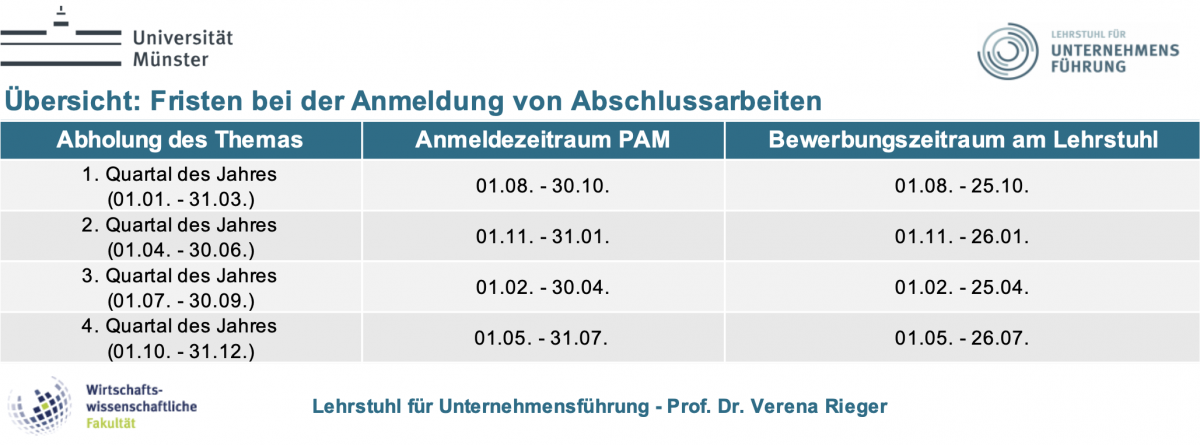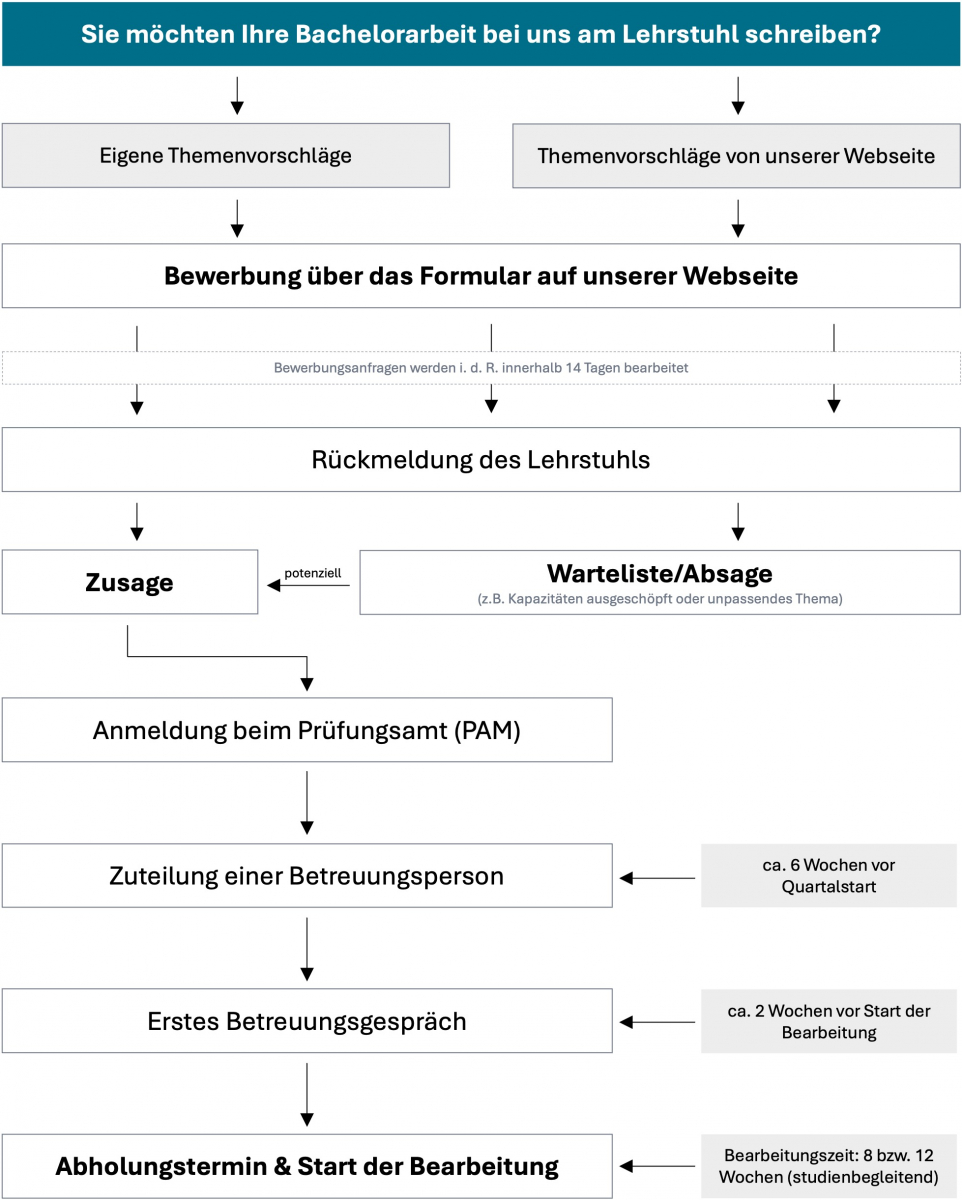Bachelorarbeiten
Wenn Sie Interesse an einer Bachelorarbeit an unserem Lehrstuhl haben, können Sie sich über unser Online-Formular bewerben.
-
Themenvorschläge
Im Folgenden finde Sie eine Liste mit möglichen Bachelorarbeitsthemen. Die Liste ist nicht vollständig und dient nur als Orientierung für die Themen, die Sie bearbeiten können. Gerne können Sie auch eigene Themenvorschläge einreichen.
Strategic Management
1. “Exploring the Role of Strategic Leadership During Economic Uncertainty”
This thesis investigates how strategic leadership can effectively guide organizations through periods of significant economic uncertainty. It focuses on how leaders adjust their strategic approaches to mitigate risks and leverage opportunities during financial downturns. The work explores the importance of resilience and adaptability in maintaining organizational stability and securing a competitive advantage under fluctuating economic conditions. The thesis will synthesize leaders’ strategic approaches and their effectiveness in crisis management, drawing upon leadership and organizational behavior theories, such as the Behavioral Theory of the Firm (e.g., Cyert & March, 1963).
Keywords: Strategic Leadership, Economic Uncertainty, Organizational Resilience
2. “Analyzing the Impact of Corporate Culture on Strategy Implementation: A Systematic Literature Review"
This systematic literature review aims to dissect the intricate relationship between corporate culture and the implementation of strategic initiatives. It will examine how an organization’s cultural values, norms, and behaviors influence the success or failure of strategic execution, focusing on how cultural alignment affects employee engagement, operational effectiveness, and strategic outcomes. The review will cover diverse organizational settings, providing a comprehensive analysis and exploring the alignment between internal culture and external strategic demands.
Keywords: Corporate Culture, Strategy Implementation, Organizational Alignment
3. “Leadership and Contradictory Demands: A Systematic Literature Review”
Organizations face competing demands in terms of achieving both innovation and efficiency, exploitation and exploration, or eco-friendliness and financial performance. These types of tensions are conceptualized in the literature as paradoxes. Top managers play an important role in managing such paradoxical tensions (e.g. Neerijnen and Tempelaar 2022). The thesis investigates in a systematic literature review based on paradox theory how top management perceives, navigates and overcomes such tensions.
Keywords: Paradox, Tensions, Contradictions, Top management, Leadership
Strategic Sustainability Management
4. “Green Innovation and Corporate Performance: A Systematic Literature Review”
This literature review assesses the impact of green innovation on corporate performance across various industries. It explores how the integration of sustainable technologies and practices not only promotes environmental responsibility but also creates new business opportunities. The review will delve into the role of green innovations in product development and supply chain optimization, and their effects on organizational sustainability and governance. By synthesizing findings from existing literature, this review aims to provide a comprehensive understanding of the trends and broader impacts of green innovation on corporate performance.
Keywords: Green Technology, Green Innovation, Corporate Social Responsibility
5. “The Impact of AI Adoption on Sustainability Performance: A Systematic Literature Review”
This bachelor's thesis examines whether AI technologies can be used to achieve economic sustainability goals. The aim of this systematic literature review is to analyze the opportunities and challenges of integrating artificial intelligence to enhance corporate sustainability performance. By synthesizing findings from existing literature, this review aims to provide a comprehensive understanding of AI adoption in firms and the broader impacts of AI adoption on sustainability performance variables.
Keywords: Artificial Intelligence, Sustainability, Corporate Social Responsibility
6. “The Influence of Chief Sustainability Officer (CSO) on Performance: A Systematic Literature Review”
This thesis examines the role of the Chief Sustainability Officer (CSO) in improving sustainability performance in firms. While some researchers argue that CSOs improve environmental outcomes, research has shown mixed results, suggesting that CSO appointments can sometimes be more symbolic than substantive (Aguilera et al., 2021). By synthesizing findings from existing literature, this review aims to provide a comprehensive understanding of the impact of CSOs on various sustainability performance metrics and the overall effectiveness of corporate sustainability strategies.
Keywords: Chief Sustainability Officer, Top Management Teams, Sustainability Performance
Digital Transformation
7. “The Impact of AI Adoption on Employee Satisfaction and Workflow Efficiency”
This thesis evaluates the implications of adopting artificial intelligence (AI) technologies on workflow efficiency and employee satisfaction within various organizational settings. It explores how AI tools may enhance decision-making capabilities, and overall operational effectiveness, while also assessing the impact on employee roles, job satisfaction, and organizational culture. The potential challenges and transformations brought by AI integration will be critically examined to explore their effects on workforce dynamics. The analysis may draw on human capital or strategic management theories, for instance, the Resource-Based View of the Firm (e.g., Barney, 1991).
Keywords: Artificial Intelligence, Employee Satisfaction, Organizational Change
8. “Leadership Dynamics in Driving Digital Transformation”
This research focuses on technology leadership roles such as Chief Information Officers (CIOs), Chief Technology Officers (CTOs), and Chief Digital Officers (CDOs) in orchestrating digital transformation within organizations. It investigates how these senior executives leverage technological advancements to reshape business models, enhance customer experiences, and improve operational efficiencies. The thesis will examine the challenges and successes of digital transformation initiatives, considering the strategic importance of technology leadership. Analysis in this area can leverage perspectives from organizational and strategic management theories, particularly the Upper Echelons Theory (e.g., Hambrick and Mason, 1984).
Keywords: Digital Transformation, Technology Leadership, Innovation Management
Strategic Innovation Management
9. “The Role of Startups in Promoting Disruptive Innovations in the Tech Industry”
This thesis explores how startups act as catalysts for disruptive innovations within the technology industry, examining their role in upending traditional business models and introducing novel solutions that significantly alter market dynamics. It considers how startups leverage their agility and innovative capacities to break into and transform established markets. Research in entrepreneurship and innovation, particularly in Disruptive Innovation Theory (e.g., Christensen, 1997), can be utilized to examine these dynamics.
Keywords: Startups, Disruptive Innovation, Tech Industry
10. “Age Diversity in Top Management Teams: Balancing Experience and Fresh Perspectives for Innovation”
With the growing trend of an aging society, age diversity within top management teams (TMT) is set to evolve significantly. This thesis aims to investigate the impact of age diversity on strategic decision-making within TMTs. It will delve into how the balance between the experience of older team members and the fresh perspectives of younger members influences their decision-making processes. The study will also examine how communication and collaboration on strategic decisions are affected, employing the attention-based view to provide a comprehensive analysis.
Keywords: Top Management Teams, Diversity, Silver Society
Strategic Success Factors of Young Ventures
11. “Critical Success Factors for Young Ventures in Emerging Markets”
This thesis identifies and analyzes the critical success factors that enable young ventures to thrive in emerging markets. It focuses on understanding the strategic, operational, and environmental challenges these young ventures face and how they navigate such complexities to achieve success. Key factors such as market understanding, local consumer behavior, and adaptive business models are examined. This research area lends itself to insights from strategic entrepreneurship, drawing on theories such as Effectuation Theory (e.g., Sarasvathy, 2001).
Keywords: Startups, Emerging Markets, Success Factors
12. “The Impact of Founding Team Composition on Startup Success”
This research delves into how the diversity in skills, experiences, and backgrounds of founding team members impacts the strategic trajectories and success of startups. It examines the critical role of team composition in fostering innovation, driving growth, and navigating competitive environments. Analysis in this area will draw upon perspectives from human resource management theories, such as the Human Capital Theory (e.g., Becker, 1964).
Keywords: Founding Teams, Startup Success, Team Composition
-
Bachelorarbeit mit Praxispartnern
Sofern Sie über entsprechende Kontakte zu Unternehmen verfügen, besteht auch die Möglichkeit, eine Praxisbachelorarbeit anzufertigen. Hierfür ist eine frühzeitige Kontaktaufnahme über unser Online-Formular notwendig, damit eine Absprache mit dem beteiligten Unternehmen erfolgen kann. Die Kandidat*innen haben dem Lehrstuhl insbesondere die Kontaktdaten zu einer konkreten Ansprechperson im Unternehmen mitzuteilen und sicherzustellen, dass die verwendeten Daten den betreuenden Mitarbeitenden und der Lehrstuhlinhaberin vollständig zur Verfügung gestellt werden. Es bietet sich an, ein Thema mit dem Unternehmen abzusprechen und dann als Themenvorschlag am Lehrstuhl einzureichen. Das Thema wird letztlich vom Lehrstuhl, ggf. in Absprache mit der angegeben Ansprechperson, festgelegt. Prüfungsrechtlich hat der Praxispartner kein Mitspracherecht bei der Bewertung der Arbeit. Vertragliche Vereinbarungen zwischen Studierenden und Unternehmen sind prüfungsrechtlich ebenfalls irrelevant und liegen allein im Verantwortungsbereich der Studierenden.
-
Bewerbung & Anmeldung
Anmeldung beim Lehrstuhl
Bitte bewerben Sie sich vor der Anmeldung beim Prüfungsamt zunächst über unser Online-Formular bei unserem Lehrstuhl.
Die Bewerbungszeiträume finden Sie in folgender Übersicht:

Im Rahmen des Auswahlverfahrens werden neben dem Zeitpunkt der Bewerbung auch die Themenpassung sowie am Lehrstuhl belegte Lehrveranstaltungen berücksichtigt. Nach erfolgreicher Zusage durch unseren Lehrstuhl können Sie Ihre Bachelorarbeit beim Prüfungsamt anmelden. Die Anmeldung ist online über FlexNow und per Formular beim Prüfungsamt möglich. Die aktuellen Anmeldezeiträume können Sie der Webseite des Prüfungsamtes entnehmen.
Anschließend wird Ihnen eine Betreuungsperson zugeteilt. In einem ersten Betreuungsgespräch wird dann Ihr Thema näher besprochen. Um mit der Arbeit zu beginnen zu können, müssen Sie den Kandidat*innenteil der Leitkarte ausfüllen und bei ihrer*m Betreuer*in einreichen. Das entsprechende Formular steht beim Prüfungsamt zum Download bereit.Eine Übersicht des Bewerbungsprozesses bis zum Abholungstermin finden Sie hier:

-
Formales
Arbeiten können auf Englisch oder Deutsch verfasst werden. Nähere Erläuterungen zur formalen Gestaltung der Arbeit finden Sie auf unserer Download-Seite.
-
Themenausgabe
Die Themenausgabe für Bachelorarbeiten kann digital erfolgen oder - nach vorheriger Absprache - direkt bei Ihrem Betreuer. Mit der Themenausgabe beginnt die Bearbeitungszeit von 8 Wochen. Sollte die Bachelorarbeit studienbegleitend abgelegt werden (d. h. bei Abholung des Themas wurden weniger als 168 ECTS-Punkte im Studium absolviert), so kann auf Antrag des Studierenden die Bearbeitungsfrist auf 12 Wochen verlängert werden. Bitte setzen Sie dazu das entsprechende Kreuz auf der Leitkarte und reichen Sie eine Notenübersicht (nicht älter als 3 Tage) mit ein. Der Lehrstuhl prüft den Antrag und bestimmt die Bearbeitungsfrist. Feiertage während des Bearbeitungszeitraums werden als Gutschrift entsprechend dazu gezählt. Dennoch ist das Abgabedatum maßgeblich für die Zurechnung zum jeweiligen Quartal, fernab von gutgeschriebenen Feiertagen. Bitte berücksichtigen Sie dies beim Ausrechnen Ihres gewünschten Abgabedatums. Den Onlinerechner für die Berechnung Ihres Bearbeitungszeitraums finden Sie hier.
Sollten Sie aufgrund z. B. von Krankheit eine Verlängerung der Bearbeitungszeit wünschen, so informieren Sie bitte Ihren Betreuer und stellen Sie einen offiziellen Antrag direkt beim Prüfungsamt.
-
Abgabe der Arbeit
Die Arbeit sollte spätestens am letzten Tag der Bearbeitungszeit digital eingereicht werden. Die Einverständniserklärung zur Plagiatsprüfung muss am Ende der Arbeit eingefügt werden (Download beim PAM).
Für das Einreichen stellt der Fachbereich 04 eine Anwendung, den Thesis Uploader bereit, welcher zwingend zu verwenden ist. Bitte klären Sie mit Ihrem Betreuer, ob eine Printversion ebenfalls gewünscht wird.Eine Kurzanleitung sowie FAQ finden Sie hier.

